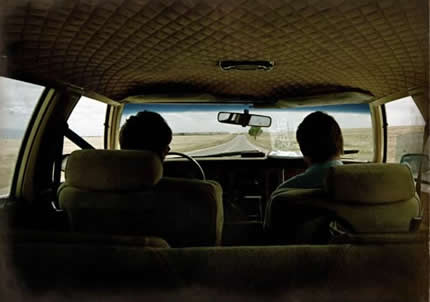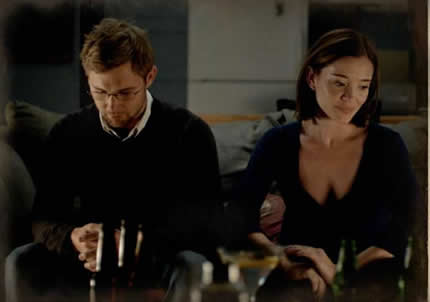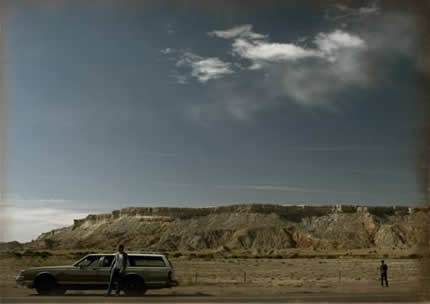In Easier With Practice Davy Mitchell sets out on a road trip to promote his unpublished novel with his younger brother. However, the idealism of being on the road wears off and it quickly proves to be a lonely and unfulfilling experience for Davy. One night in a motel room, he gets a random phone call from a mysterious woman named Nicole. They start a funny and intimate long distance relationship that leaves Davy happier than he has been in years. Hoping there is more to the relationship then a voice and a phone bill, Davy decides he wants to meet Nicole. Ultimately, he will have to face not only the truth about their relationship, but the truth about himself.
Here is an interview with Kyle Patrick Alvarez, director of Easier With Practice
Bijan Tehrani: Please tell me how you first came up with the story of Easier With
Practice?
Kyle Patrick Alvarez: Well, this is based on a true story that was originally an article in GQ magazine. I was living in LA for a year working as an assistant and I decided to leave my job because I wanted to make a film, so during my two weeks notice I read this article and immediately decided that this was the kind of story that I wanted to make into a film.
BT: This is a very unusual story to turn into a movie, and it took a lot of bravery to make a film like this. What were some of the challenges you faced while making the film?
KPA: The phone scenes, where you don’t ever cut away, made the movie really tough to make. It was interesting trying to come up with the right kind of coverage; I discussed it with the cinematographer, and we decided to just keep the camera rolling and only allow cuts that were highly motivated. It’s more challenging for the actors but I think that they like it in the long run—it reminds them of theatre. I know that Brian really liked it because it made him responsible for the entire scene.
BT: How did you go about casting Easier With
Practice?
KPA: We hired these really great casting directors who have done a number of independent films, such as Stephanie Daly with Tilda Swinton and Amber Tamblyn. When we hired them, we auditioned over 200 people and we were really picky, especially when it came to casting for the lead.
 BT: Did you rehearse prior to shooting the film?
BT: Did you rehearse prior to shooting the film?
KBA: Not really. Brian and I talked a lot and that was pretty much our rehearsal. We just went over the ins and outs of the script and if there was anything that he felt uncomfortable with, whether it be a line of dialogue or motivation, we addressed it. But in terms of proper rehearsals, we just didn’t have the time or money.
BT: Were the actors allowed to improvise?
KBA: I come from the school of though that the less you say to actors, the better. I had never worked with professional actors, and had noticed from my previous short films that I had talked to the actors too much. I let the actors improvise a lot. Some instances you can’t, but we followed the script 80% of the time.
BT: Did you come up with the ending of the Easier With
Practice?
KBA: Well, this was a true story and this really happened to the man that wrote the article. What appealed to me about the ending was not so much what happened, but rather how it is handled. What I like about the way the author handled the ending was the way he addressed the human aspect of the situation.
BT: Once people see the ending of the film, do you think that they will view the film again?
KBA: I never wanted to make it a twist film; I always kind of worked against that. I tried to make it so if you knew the ending, then the movie would still be entertaining. 
BT: How did you come up with the visual style of the film?
KBA: The cinematographer and I had similar insight and taste. I looked at a lot of films that I respected, and decided what it was about the visual style that was appealing to me. We bought books on cinematographers that we liked and tried to emulate their visual style.
BT: How have audiences responded to Easier With
Practice?
KBA: The audience response has been very humbling; people really seem to like the film. I made the decision early on that I can’t make a film for everyone, but overall I think that I have made a film that is entertaining. But I think that people have responded the way we hoped they would.
BT: To me, your work was like some of the short stories from authors like Faulkner, where you deal directly and honestly with the characters. Would you agree with this comparison?
KBA: It was challenging, because you don’t want to make a movie that people can connect with, but we were determined to make this movie about one character.
BT: Do have any new projects lined up?
KBA: Definitely, some are finished scripts and others are original ideas. For the time being, they’re probably going to be independent productions, so it’s going to be challenging but I really want to make another film.

